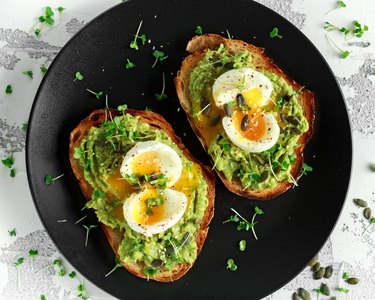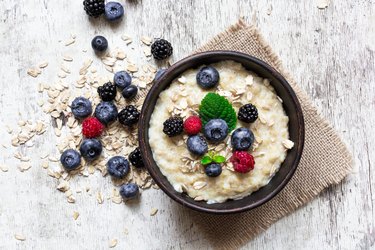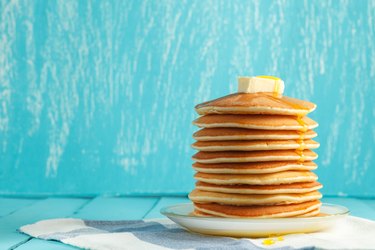
When it comes to your first meal of the day, do you tend to grab whatever's in reach while you're on your way out the door or hit the nearest drive-thru on your way into work? Perhaps you skip breakfast altogether?
If you're trying to lose weight, these strategies aren't helping. They may even be hindering your progress.
Video of the Day
Video of the Day
But the good news is, eating breakfast — and one that will help you reach your weight-loss goals — doesn't have to be complicated or time-consuming. It can actually be quite simple.
Just eating breakfast in the first place — versus going without or simply sipping on coffee — is a great place to start. But of course, your food choices matter, too. Here's what to reach for in the a.m. and what to take off your plate.
4 Breakfasts to Eat When You’re Trying to Lose Weight
If you're trying to lose weight, don't skip breakfast and don't overcomplicate it. Here are some great, easy options.
1. Scrambled Eggs

When it comes to breakfast foods, we love our carbs. While there's nothing wrong with carbohydrates — your breakfast is actually better off with them — we tend to eat more carbohydrate-rich foods (i.e., cereal, yogurt, fruit, oatmeal) and subsequently, less protein-rich foods.
In fact, Americans eat almost 75 percent of their protein at lunch (31 percent) and dinner (41 percent), and only 16 percent at breakfast, according to a July 2020 data brief from the United States Department of Agriculture (USDA). (The remaining is consumed via snacks.)
This can be an issue if you're trying to lose weight because, compared to fat and carbohydrates, protein gives our metabolism the greatest boost and is also the most satiating.
Tip
Aim to eat 1.3 grams of protein per kilogram of body weight each day. A 150-pound person, for example, should shoot for about 88 grams of protein daily.
This is where scrambled eggs come in. It takes less than five minutes to whip up a couple of eggs, and you'll be better off for it. Aside from their protein content — about 7 grams per egg — they're also loaded with other important nutrients, according to the USDA (zinc, vitamin D and vitamin B12, to name just a few).
For a balanced meal, pair your scrambled eggs with some fruit (like a banana) or a slice of toast. Add nut butter too, for some healthy fat that will help slow your digestion and keep you feeling fuller longer.
Try This Recipe
2. Avocado Toast
Mashed avocado on a slice of whole-grain bread and topped with an egg or two just might be the perfect breakfast. First, it's quick to make, and who doesn't love/need that in the a.m.? It also provides a great balance of complex carbohydrates, healthy fats and protein.
Avocado is primarily made up of healthy monounsaturated fats. It's also a good source of fiber. Both of these components help you feel fuller for longer (aka less likely to reach for the snacks).
Ready to Lose Weight?
Set yourself up for success with LIVESTRONG.com's Weight-Loss Kickstart program.
A May 2019 study published in Nutrients compared three different breakfast meals — all with similar calorie amounts. The researchers analyzed the effects of adding a half or a whole avocado in place of carbohydrates. They found that despite eating the same amount of calories, the meals that had the addition of fiber- and fat-rich avocados led to a greater suppression of hunger (in the whole avocado group) and greater reported satisfaction post-meal for both avocado groups.
It is worth noting that ghrelin (an appetite-stimulating hormone) was suppressed more by the control group versus the avocado groups.
Try These Recipes
3. Oatmeal

Yes, oatmeal is rich in complex carbohydrates and we said before that you should increase your protein intake at breakfast (see scrambled eggs), but hear us out. First of all, oatmeal contains protein and it's probably more than you think.
One cup of oatmeal provides 165 calories, 28 grams of carbs, 4 grams of fiber, 6 grams of protein and numerous nutrients like iron and magnesium, according to the USDA. This means a serving of oatmeal provides just as much protein as an egg, along with more than 15 percent of your daily fiber.
Tip
Women should aim for about 25 grams of fiber each day, while men should get about 38 grams.
Oatmeal also contains a unique fiber called beta-glucan. Research shows beta-glucan may keep you feeling fuller longer and it may help you eat less. An August 2018 clinical study published in Appetite looked at the effects of two different breakfasts — one with beta-glucan and one without — and found that the people who ate the former reported increased satiety and fullness after eating.
An earlier August 2015 study published in the Journal of the American College of Nutrition found that eating instant oatmeal led to an increase in fullness and lower caloric intake at the next meal compared to the group who ate an oat-based cold cereal.
Try These Recipes
4. Yogurt Parfait
Breakfast parfaits can be tricky because they can easily go either way — uber healthy or loaded with sugar. The key is using healthier ingredients to build your breakfast.
Let's start with yogurt. Opting for plain, unsweetened yogurt is your best bet, especially compared to most flavored yogurts that are packed with sugar or even artificial sweeteners. If you choose a plain Greek yogurt over regular, you'll get an extra protein boost.
A serving of Greek yogurt provides 20 grams of protein while a serving of regular yogurt typically provides about 9 grams, according to the USDA. Protein requires more energy to digest, helps to preserve our lean body mass and provides greater satiation compared to carbs and fat, as explained in a July 2016 review article published in Annual Reviews.
Then there's the toppings: For sweetness, go with fresh fruit. Avoid the store-bought type that typically include fruit swimming in a sugary syrup. And for crunch, granola is a common go-to. Look for a whole-grain cereal that is lower in added sugar.
3 Breakfasts to Limit if You’re Trying to Lose Weight
Some of these may look familiar (see above) —confusing, right? But keep in mind that it's often how foods are made that can take them from a healthy food to the other end of the spectrum where they're packed with sugar and low in healthy carbs, fats and protein.
1. Bagels, Pancakes and Waffles

What do all three have in common? They're made with refined grains and our diets are overloaded with them.
A September 2019 study published in the Journal of the American Medical Association found that more than 40 percent of the total calories we eat each day come from low-quality carbohydrates. Bagels, pancakes, waffles and other baked breakfast goods tend to be low in whole grains, which means they're lower in fiber and sometimes other nutrients.
This doesn't mean we have to skip these delicious breakfast foods altogether, but make some simple switches instead. When it comes to bagels, look for one made from whole-wheat or whole-grains. The same goes for pancakes and waffles. There are more and more whole-grain pancake and waffle mix options available at supermarkets today. These will all give you a boost of fiber and nutrients.
How you top these foods counts, too. Maple syrup is a natural sugar, yes, but it's still an added sugar. Keep in mind that the American Heart Association recommends limiting your daily added sugar intake to 25 grams (100 calories) for women and 36 grams (150 calories) for men.
Try These Recipes
2. Packaged and/or Sugary Oatmeal
Yes, we said oatmeal is a great breakfast pick if you're trying to lose weight, but this doesn't include the flavored oatmeal packets that are loaded with sugar or adding spoonfuls of brown sugar to your bowl of homemade oats either. These small packets can include 8 grams of added sugar and minimal fiber or protein.
You'll likely be left feeling hungry soon after and your blood sugar could dip, too (cue a hangry jaunt through the snack cabinet).
When making oatmeal — instant packets or the slow-cook type — stick with the plain flavor and try to avoid using added sugars. Top your oats with fresh or dried fruit instead. And getting in some protein and fat is crucial, too, especially when it comes to managing your appetite and stable blood sugar levels. Using milk or a plant-based milk with protein to make the oats is an easy way to do this. Adding nuts or nut butters is another great option to consider.
3. A Small Breakfast or No Breakfast at All

About 25 percent of American adults regularly skip breakfast, according to the Center for Science in the Public Interest. And just grabbing a banana on the way out the door likely won't cut it either. Here's why:
There's a growing body of research that shows that eating a bigger breakfast (i.e. more calories) in the morning may better serve you compared to eating a bigger dinner, especially when it comes to weight loss.
One February 2020 study published in The Journal of Clinical Endocrinology & Metabolism looked at the thermogenic effect of food (i.e. the energy it takes to digest food) and found that we burn more — as in 2.5 times more energy — processing breakfast over dinner.
Another study, published March 2013 in Obesity, specifically looked at the way we distribute our calories throughout the day and the effect it has on our weight. The researchers of the 12-week study found that even when eating the same amount of calories per day, the group who ate more in the morning and less at night lost more than twice the amount of weight as those who ate a lighter breakfast and consumed more in the evening.
- United States Department of Agriculture: "Protein Intake of Adults What We Eat in America, NHANES 2015-2016"
- MyFoodData: "https://tools.myfooddata.com/nutrition-facts/171287/wt1/2"
- Nutrients: "Using the Avocado to Test the Satiety Effects of a Fat-Fiber Combination in Place of Carbohydrate Energy in a Breakfast Meal in Overweight and Obese Men and Women: A Randomized Clinical Trial"
- MyFoodData: "Cooked Oatmeal"
- Appetite: "Effects of Oat B-Glucan Consumption at Breakfast on Ad Libitum Eating, Appetite, Glycemia, Insulinemia and GLP-1 Concentrations in Healthy Subjects"
- Journal of the American College of Nutrition: "Instant Oatmeal Increases Satiety and Reduces Energy Intake Compared to a Ready-to-Eat Oat-Based Breakfast Cereal: A Randomized Crossover Trial"
- USDA: "Nutrition Comparison of Plain Greek Yogurt Plain vs Plain Yogurt"
- Annual Reviews: "The Macronutrients, Appetite, and Energy Intake"
- Journal of the American Medical Association: "Trends in Dietary Carbohydrate, Protein, and Fat Intake and Diet Quality Among US Adults, 1999-2016"
- American Heart Association: "Added Sugars"
- Center for Science in the Public Interest: "To Skip or Not to Skip breakfast: That is the Question"
- The Journal of Clinical Endocrinology & Metabolism: "Twice as High Diet-Induced Thermogenesis After Breakfast vs Dinner On High-Calorie as Well as Low-Calorie Meals"
- Obesity: "High Caloric Intake at Breakfast vs. Dinner Differentially Influences Weight Loss of Overweight and Obese Women"